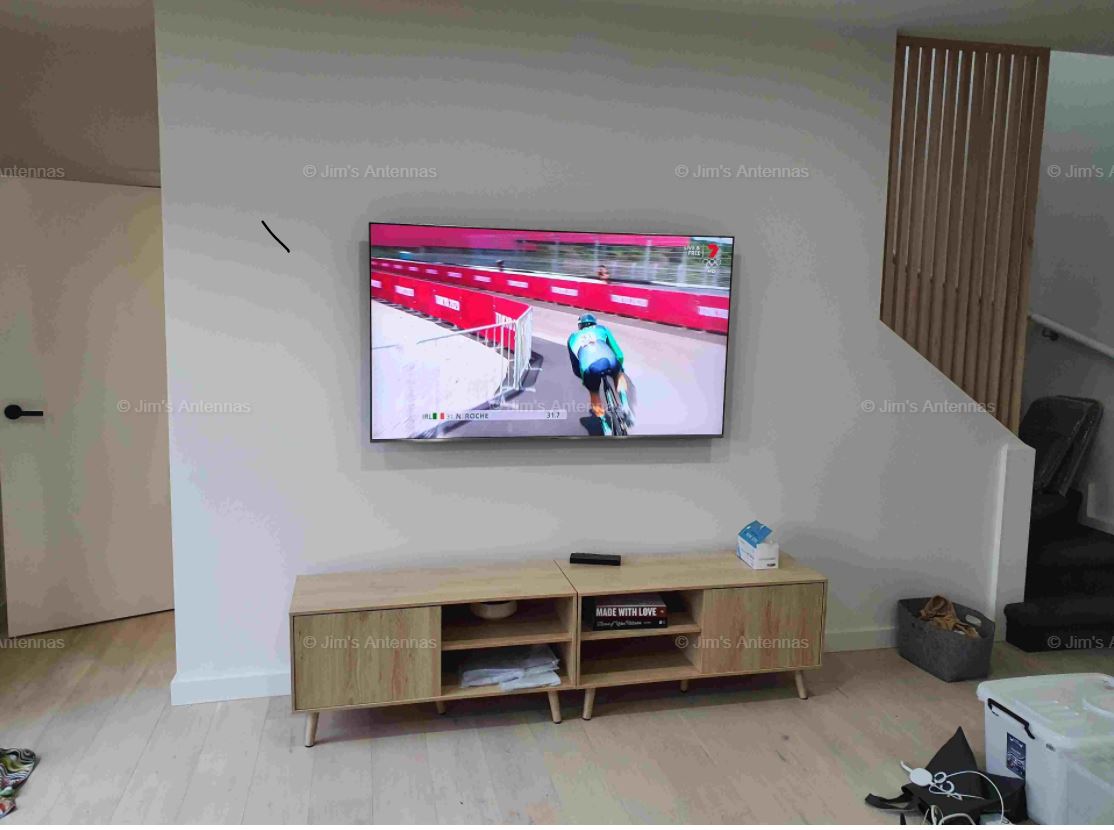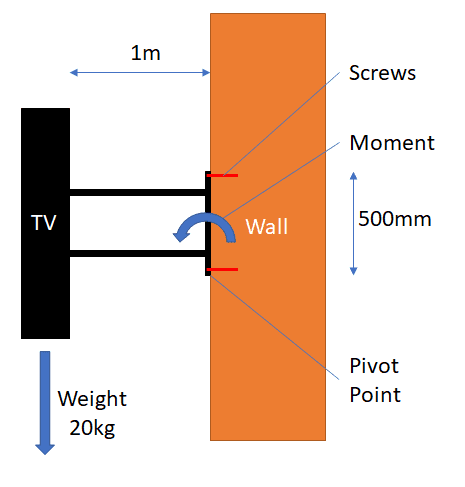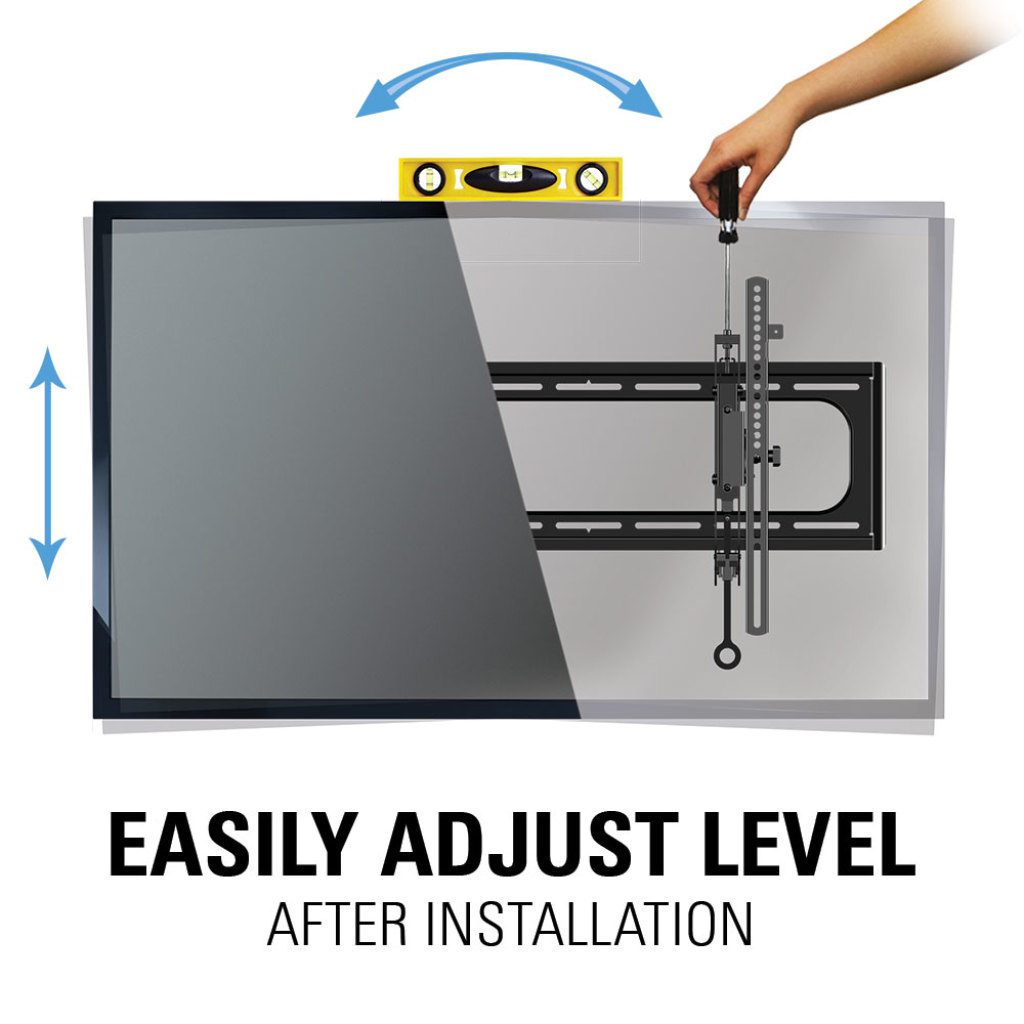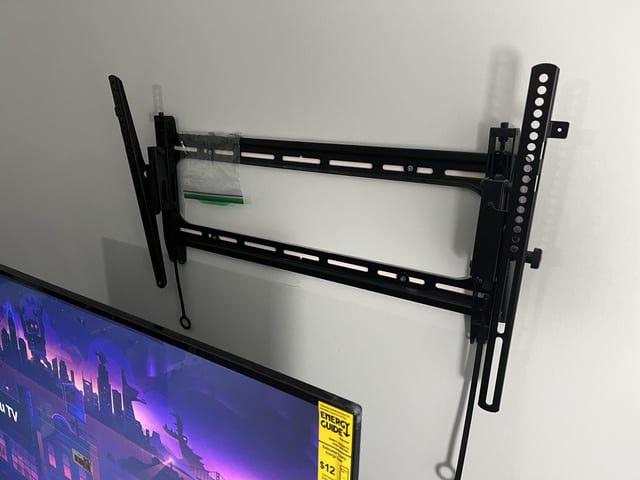A TV mount can hold a weight range of 15 to 200 pounds. TV mounts have weight specifications that ensure stability and safety for various TV sizes.
With a weight capacity ranging from 15 to 200 pounds, TV mounts can securely hold your TV and free up valuable space in your home. The weight limit of a TV mount should be carefully considered before installation to prevent any damage or accidents.
Whether you have a smaller or larger TV, there is a suitable TV mount available to accommodate your needs. We will explore the factors that determine how much weight a TV mount can hold, as well as provide some tips for selecting the right TV mount for your television.

Credit: mountingdreamonline.com
Different Types Of Tv Mounts
TV mounts come in various types, each with different weight capacities. It’s crucial to choose a mount that can securely hold the desired TV’s weight, preventing any accidents or damage. Understanding the different types of TV mounts will help determine the appropriate weight capacity for your television.
Fixed Tv Mounts
Fixed TV mounts are the simplest and most common type of TV mounts available in the market. These mounts securely attach your TV to the wall, keeping it in a fixed position. They are suitable for rooms where you have a dedicated seating area directly in front of the screen, as it does not offer any flexibility in terms of adjusting the viewing angle.
Fixed TV mounts are capable of supporting a significant amount of weight, typically ranging from 40 to 150 pounds (18 to 68 kilograms), depending on the model and brand. However, it is essential to check the weight limit specified by the manufacturer before purchasing a fixed TV mount.
Tilting Tv Mounts
Tilting TV mounts, as the name suggests, allow you to tilt your TV vertically to achieve a better viewing angle. These mounts are ideal for installations where the TV needs to be mounted higher than eye level, such as above the fireplace. By tilting the screen downward, you can optimize the viewing experience, reducing neck strain and glare.
Tilting TV mounts can typically support a similar weight range as fixed TV mounts, ranging from 40 to 150 pounds (18 to 68 kilograms). However, it is essential to consider the tilt range provided by the mount, as this can vary between models. Some tilting TV mounts offer a limited tilt range, while others provide a more extensive range of adjustment.
Full-motion Tv Mounts
Full-motion TV mounts, also known as articulating TV mounts, offer the most flexibility in terms of adjusting the viewing position of your TV. These mounts allow you to tilt, swivel, and extend the TV away from the wall, providing an optimal viewing experience from various angles.
The weight capacity of full-motion TV mounts varies significantly depending on the specific model and brand. The weight range can be as low as 20 pounds (9 kilograms) for smaller screens and can go up to 175 pounds (79 kilograms) for larger screens. It is crucial to check the weight capacity and recommended screen size of the mount before making a purchase.

Credit: www.jimsantennas.com.au
Weight Capacity Of Tv Mounts
TV mounting has become increasingly popular as it provides a sleek and space-saving solution for displaying televisions. However, it’s crucial to ensure that the TV mount you choose can support the weight of your television. Determining the weight capacity of TV mounts is essential to avoid accidents, damage, and unnecessary expenses. In this section, we will explore the importance of understanding weight ratings, as well as the significance of following weight limits.
Determining Tv Weight
Before purchasing a TV mount, it’s critical to know the weight of your television. This information can usually be found in the TV’s user manual or on the manufacturer’s website. Knowing the exact weight is essential as it will help you choose a TV mount with the appropriate weight capacity. Simply put, you cannot select a mount that is unable to support your television’s weight, as it can lead to instability and potential damage.
Understanding Weight Ratings
Weight ratings for TV mounts are specified by manufacturers and indicate the maximum weight a particular mount can safely support. These ratings can range from a few pounds to several hundred pounds, depending on the mount’s design and intended use. It’s imperative to understand that weight ratings are not flexible guidelines; instead, they serve as a crucial safety measure to prevent accidents or structural failures. Exceeding the weight limit of a TV mount can lead to catastrophic consequences, risking both your television and your well-being.
Importance Of Following Weight Limits
- Stability: Following weight limits ensures the stability of your mounted TV. A mount with too low weight capacity can cause the television to lean, tilt or even fall off, endangering you, your loved ones, and your possessions.
- Durability: By adhering to weight limits, you ensure that your TV mount remains strong and durable over time. Excessive weight can strain the mount’s components, leading to premature wear and tear.
- Warranty: Manufacturers often void warranties if their products are used outside the specified weight limits. By following the weight capacity guidelines, you can retain the warranty coverage, providing you with additional peace of mind.
Factors Affecting Weight Capacity
When it comes to choosing a TV mount, it is essential to consider the weight capacity of the mount. The weight capacity determines how much weight the mount can safely hold. Several factors can affect the weight capacity of a TV mount, and understanding these factors can help you make an informed decision.
Mounting Surface
The mounting surface plays a crucial role in determining the weight capacity of a TV mount. The surface should be strong and stable enough to support the weight of the TV and the mount. When mounting a TV on a wall, it is vital to ensure that the surface is solid, such as a concrete or brick wall. Mounting a TV on a hollow wall may not provide sufficient support, leading to potential damage or accidents.
Stud Strength
Another factor that affects the weight capacity of a TV mount is the strength of the studs in the wall. Studs are vertical wooden or metal beams within the wall that provide support. The TV mount needs to be securely attached to the studs for maximum weight capacity. It is recommended to use a stud finder to locate the studs and ensure that they are strong enough to hold the weight of the TV and the mount. The use of toggle bolts or anchors can be considered if studs are not available or not strong enough.
Quality Of Mounting Hardware
The quality of the mounting hardware can significantly impact the weight capacity of a TV mount. The mounting hardware includes screws, bolts, and other fasteners used to secure the TV mount to the surface. It is crucial to use high-quality and appropriately sized hardware to ensure a secure and stable installation. Using low-quality or undersized hardware may compromise the weight capacity of the TV mount, leading to potential risks.
Overall, when selecting a TV mount, it is essential to consider the factors that affect weight capacity. The mounting surface should be strong and stable, the studs in the wall should provide sufficient support, and high-quality mounting hardware should be used. By taking these factors into account, you can ensure that your TV mount can safely hold the weight of your TV, providing peace of mind and a secure installation.
Common Tv Mount Weight Limits
A TV mount weight limit specifies how much weight a mount can support, ensuring safe and secure installation. Understanding your TV’s weight is crucial to select the appropriate mount for your needs.
When it comes to mounting your TV, it’s crucial to choose a TV mount that can safely support the weight of your television. Understanding the weight limits of different TV mounts is essential to ensure a secure installation and prevent any mishaps. In this section, we will explore the weight range for different mount types and the factors to consider in determining weight limits.
Weight Range For Different Mount Types
TV mounts come in various types, each designed to accommodate a specific weight range. It’s important to choose a mount that matches the weight of your TV to guarantee proper support. Here are the weight ranges for the most common TV mount types:
| Mount Type | Weight Range |
|---|---|
| Fixed Mount | Up to 150 lbs |
| Tilting Mount | Up to 90 lbs |
| Articulating Mount | Up to 70 lbs |
These weight ranges serve as important guidelines to select the appropriate TV mount for your television. Remember to consider not only the weight of your TV but also the weight of any additional accessories, such as soundbars or cable boxes.
Factors To Consider In Determining Weight Limit
The weight limit of a TV mount is dependent on several factors. Understanding these factors will help you make an informed decision about your TV mounting options. Here are some factors to consider when determining the weight limit:
- The mounting material: The type of wall or surface you are mounting your TV on plays a significant role in determining the weight limit. Different materials may have different load-bearing capacities.
- Stud spacing and alignment: Mounting your TV to studs provides the most secure and reliable support. Ensure that the mount aligns with the stud spacing in your wall for maximum weight capacity.
- TV size and dimensions: Larger TVs tend to weigh more, so it’s crucial to consider the overall size and dimensions of your TV when selecting a mount.
- VESA compliance: VESA (Video Electronics Standards Association) ensures compatibility between TVs and mounts. Check if your TV and mount have matching VESA standards to ensure weight limits are met.
- Quality and durability of the mount: Opting for a high-quality, durable mount from a reputable brand will ensure that it can withstand the weight of your TV for an extended period.
Considering all these factors will help you determine an accurate weight limit for your TV mount and ensure a safe and secure installation.
Proper Installation And Safety Tips
When it comes to mounting your TV, it’s crucial to ensure proper installation and follow safety guidelines to avoid any accidents or damage. This section will provide essential tips for safely securing your TV mount and checking for any potential mounting issues.
Using An Installer’s Guide
Before you begin the installation process, it’s wise to refer to the manufacturer’s installation guide or the installer’s manual. These guides provide step-by-step instructions tailored specifically to your TV mount model, ensuring that you set it up correctly. The guide will offer valuable information on weight capacity, compatible wall types, and important safety measures to be aware of.
Installing a TV mount without referring to the installer’s guide may increase the risk of mounting failure or potential accidents. Also, make sure to gather all the necessary tools and equipment listed in the guide before commencing the installation to ensure a smooth and hassle-free process.
Securing The Mount Properly
The key to a secure TV mount is proper anchoring to the wall. The strength of the mount depends on how effectively it is secured. Here are some important tips to follow:
- Find the right wall location: Choose a solid wall with sturdy support that is capable of handling the weight of your TV and the mount. Avoid mounting on plasterboard or weak surfaces.
- Locate studs: Locate the wall studs using a stud finder and mark their positions accurately. Mounting your TV directly to the studs offers the most stability.
- Use the right hardware: Depending on the type of wall and the TV mount, ensure you use appropriate screws, bolts, or anchors provided in the installation kit.
- Follow the drill pattern: Many TV mounts come with a drill pattern template. Use this template to mark and drill holes precisely, aligning with the wall studs. This ensures a secure fit for the mount.
- Double-check the alignment: Once the mount is attached, double-check its alignment by using a level to ensure that it is perfectly horizontal or tilted as desired.
- Hang the TV on the mount: Carefully attach the TV onto the secure mount and check if it is firmly in place. If your TV mount has a locking mechanism, make sure to engage it to prevent accidental dislodging.
Checking For Signs Of Mounting Issues
After the installation, it’s important to check for any signs of potential mounting issues that could compromise the safety and stability of your TV mount. Here are a few things to watch out for:
- Visible cracks or damage: Inspect the mount and the wall for any visible cracks or signs of damage. If you spot any, seek professional assistance and avoid using the mount until it is resolved.
- Sagging or tilting: Over time, the weight of the TV can cause the mount to sag or tilt. Regularly inspect your TV mount to ensure it remains level and stable.
- Loose connections: Check all the bolts, screws, and connectors regularly to make sure they are tightly secured. Any loose connections should be addressed immediately to maintain a secure mounting.
- Strange noises: If you notice any unusual noises coming from the wall or mount area, investigate the cause as it could indicate a problem with the installation.
By following these proper installation and safety tips, you can ensure a secure and stable TV mount that can safely hold the weight of your television, providing you with a comfortable and enjoyable viewing experience.

Credit: diy.stackexchange.com
Frequently Asked Questions For How Much Weight Can A Tv Mount Hold
How Do I Know How Much Weight A Tv Mount Can Hold?
To determine the weight a TV mount can hold, check the manufacturer’s specifications or user manual. These documents provide the maximum weight capacity for the mount. Avoid exceeding the recommended weight limit to ensure proper installation and safety.
Can A Tv Be Too Heavy To Mount?
Yes, a TV can be too heavy to mount. TVs have weight limits that should be followed to prevent damage or accidents. Always check the mounting capacity of your TV and ensure it is suitable for the wall mount being used.
Exceeding weight limits can lead to instability and potential harm.
Can You Hang A 100 Pound Tv?
Yes, you can hang a 100 pound TV as long as you have a sturdy wall mount designed to hold that weight. Make sure to properly secure the mount to the wall studs for added stability. It’s always a good idea to consult a professional or follow the manufacturer’s instructions for installation.
How Much Weight Can A 65 Inch Tv Mount Hold?
A 65 inch TV mount can typically hold a maximum weight of around 100-150 lbs.
Conclusion
To determine the weight a TV mount can hold, it is essential to consider its maximum weight capacity and the specifications provided by the manufacturer. By ensuring that the TV and the mount are compatible in terms of weight, size, and VESA mounting pattern, you can ensure the safety and stability of your TV installation.
Remember, exceeding the weight limit can lead to damage both to the TV and the wall. It’s always better to be cautious and consult the manufacturer’s guidelines for an optimal viewing experience.
- Unleash the Potential: Exploring the World of Ceiling TV Mounts - February 15, 2024
- How to Mount a Tv on a Swivel Stand - February 15, 2024
- How to Hang Tv Outside - February 14, 2024


